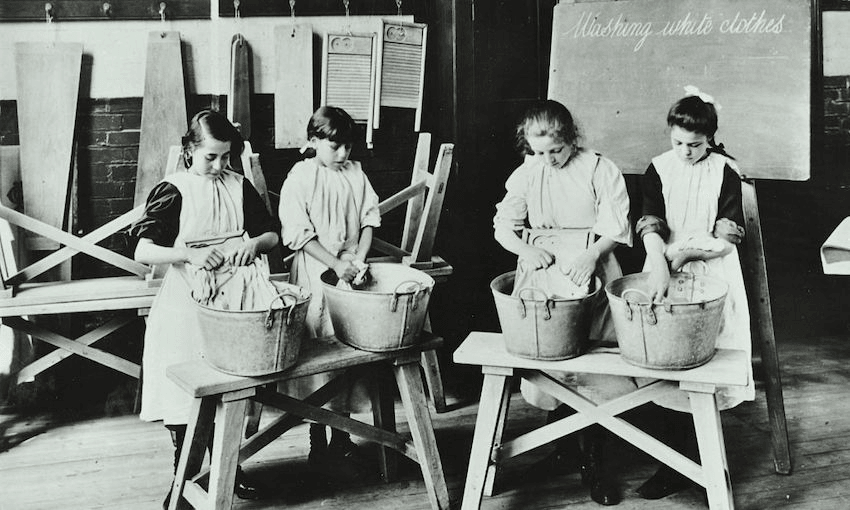David Hill reflects on his mother’s life of servitude, and that of many others like her.
My mother spent most of her adult life being a servant.
We don’t have servants now. We have service industries (I actually thought all industries provided services), but we don’t call their employees “servants”. They’re enveloped in euphemisms: “personal companion… domestic aide… household facilitator”. In more honest moments, we accept “housekeeper”. But the word “servant” is badspeak.
Yet my mother was one. She said so on the electoral roll once, when she spent a couple of post-school years washing, sweeping, stove-blacking for a sheep baron’s family in Hawke’s Bay.
When my bolshie Scottish grannie heard, she told Mum that we were lackeys nae longer, lassie. On the next electoral roll, my mother appeared as “helper”.
My grandfather would have approved. He’d been a gillie on a Berwickshire estate until WW1. After those monstrous years, he swore he’d never call any man “sir” again. So the family sailed for New Zealand.
Scarlet fever struck their ship. Kids went down, burning, delirious. One died. My grandparents watched their five in terror, but only my 10-year-old mum became ill. She lay in pain and distress for a week, then recovered.
Since she now had – everyone hoped – some immunity, she was sent below to where afflicted children lay in cabins curtained off by sheets soaked in disinfectant. For five days, she cleaned them, fed them. When they were judged to be out of danger, she came stumbling up on deck, and screamed because she’d gone blind. She hadn’t, of course: it was the sun after her days in semi-darkness.
In retrospect, the shipboard episode seems just a variation on her life as a servant. She’d been a de facto one in Scotland; all girls of her class and time were. She carried ashes from the fire; dragged buckets of peelings to the pig; holystoned the kitchen table. Sounds like a Monty Python skit, but the way she told it, it was normal and even dignified.
Now in rural New Zealand, she did the same, till she was old enough to leave home, work on that sheep station and a couple of others. Nothing really changed after she married, except that she wasn’t paid for her labours any longer.
And they were labours. In the shabby rented cottage where I grew up, she scoured the tin bath; boiled washing in a copper and fed it through a hand-turned wringer; beat rugs on the clothesline to remove dust from old floors and fire.
Her hands were red and swollen-knuckled as a result. In next door’s big, handsome house, Mrs McLeod the lawyer’s wife had slender, well-maintained hands, and I used to feel irritated that my mother didn’t look after hers. Mrs McLeod was gracious, courteous, and Mum disliked her viscerally. Well, Mrs McLeod had a twice-weekly lady help (another euphemism), and I’m sure her own remoteness from such work seemed a goad and a disparagement to my mother.
My brick-making, then wool-classing father did hard physical work as well, but he was paid for it. He and I treated Mum as our servant, with love on his part, the usual filial nexus of reliance, resentment, obliviousness on my part.
We put out our clothes for her to wash and iron, sat down to eat the food we expected her to cook, never noticed the floors she’d swept and polished. She was a working-class wife/mother; expected and was expected to serve. Was she content? Proud? How should I know? She was only my mother. I do know she was determined for me to “do better”; equally determined I wouldn’t get too big for my boots.
Even when she returned to paid work, she still endured the humiliations of servitude. At the tobacco factory, she was groped by a foreman. In the hospital laundry, she had stained bedding tossed at her feet, with the order, “Get those done as soon as possible, will you?”
Her work remained physically demanding: wrenched neck; varicose veins; scalded hands. I never acknowledged it; wouldn’t have known how to, or why I should.
There were – still are – masses like her. So to all of them, whether they’re housekeepers on just $18 per hour, or homemakers still unwaged in spite of representations to parliament, I’ll paraphrase misogynistic old St Matthew. “Well done, all you good and faithful and unappreciated servants.”
